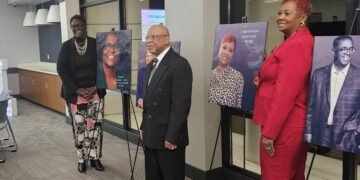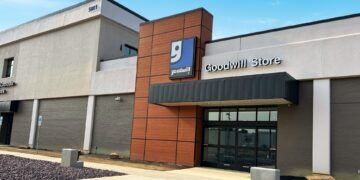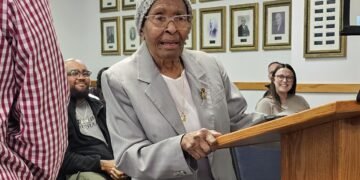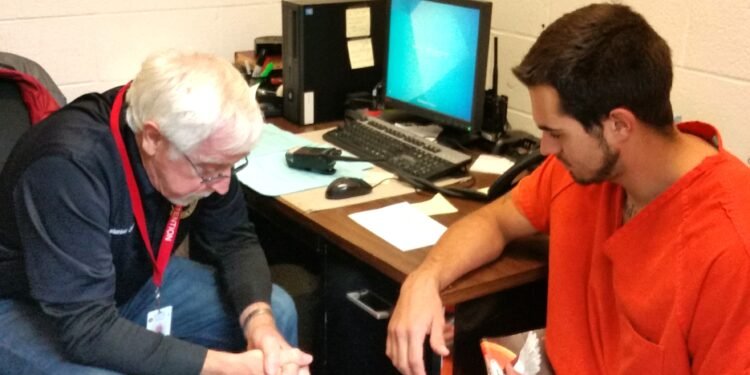(This article first appeared in the September print edition of the Hendersonian)
In 2002, the Good News Jail & Prison Ministry came to the Henderson County Detention Center, and according to Chaplain Kenny Noblett, the ministry has helped hundreds, if not thousands, of inmates turn their lives around.
The local ministry provides life skills and substance abuse recovery counseling, has a chapel within the jail, a library full of donated Bibles and other books and teaching videos, and it has attracted volunteers from the region who come to the jail to work with inmates, Noblett said.
Good News offers a “Life Change Program,” which deals with life skills, and a “Life Recovery Program,” which seeks to help inmates overcome substance abuse. In both, inmates must complete an application and be accepted into the program, said Noblett, who has led the program for seven years.
Also at the jail is another, smaller ministry called New Genesis that was started in 2007 by Steve Raleigh. It’s a nonprofit organization with the goal of providing one-on-one mentors to inmates as well as helping them upon their release—“to walk them through that” and assist with integration back into society, Raleigh said.
“We’ve probably mentored a couple hundred inmates,” Raleigh said.
But the COVID-19 pandemic took a toll on the ministry and since then it lost a lot of its momentum, said Raleigh. Raleigh is very active and enthusiastic about his volunteering with Good News, and he’s at the jail daily.
And though the organization he started has dwindled, Raleigh has continued to do the legally required paperwork so that the ministry stays viable.
Which, it turns out, is a different sort of good news, say both Noblett and Raleigh.
On Sept. 1, Jailer Bruce Todd is scheduled to notify Good News that the HCDC will no longer be partnering with its service.
Noblett pitched the idea to Todd, and the jailer agrees that the local jail ministry needs to have local control. Because New Genesis has kept its nonprofit status active, Noblett and Todd have agreed to pull out of Good News and move all operations and fundraising under the New Genesis umbrella.
On Oct. 1, the transition from Good News to New Genesis will be complete. The move will include a local board to making decisions best for the community, Noblett said.
Noblett said for all the positives of Good News, he has seen a couple flaws through the years.
For one, the ministry was limited in what it could do upon the release of inmates, often the most critical moments of his or her re-integration into society.
Good News is a national organization, based in Virginia, that oversees some 300 ministries in the United States and some in other countries, Noblett said. It disperses funds for the jail ministry and somewhat sets the agenda for what a ministry at a local jail can do, Noblett said.
That agenda, according to Noblett, doesn’t include funding for inmates’ after care needs, sometimes needs that are urgent, which has often left him and other volunteers scrambling for ways to help as they are released into the world. That could mean phone calls to the Harbor House in search of an open bed, paying for a hotel room out of their own pocket or driving long distances and paying for gas to get to a suitable location, like a rehab center.
If there’s no way to get to rehabilitation centers—and landing back in places full of their vices—released inmates are often faced with decisions and many times they make the wrong decisions that leads them back to jail, Noblett said.
Second, the money that is raised locally for Good News doesn’t stay locally, Noblett said. It goes to the offices of the national organization and then gets spread out, Noblett said. In effect, local money helps to fund Good News jail ministries around the nation and world, Noblett said.
“There needs to be more local input,” Noblett said. “So that the needs of individuals in our jails can be met.”
Noblett said that local control of the program is vital to its success—the Henderson community should have a say in how Henderson inmates are rehabed and returned to the community.
And money raised in Henderson stays in Henderson, he said. Local fundraising will go “straight to this jail and this jail alone,” he said.
“It all stays right here,” Raleigh said of fundraising. And when the budget is set locally and the money is used based on the needs of HCDC inmates, New Genesis will be able to provide more continuity from being in jail to being released, Raleigh said.
Additionally, local citizens should have the opportunity to fund and have more of a say in how fellow citizens are treated in jail, Noblett said. He said there are few people who don’t know somebody who’s been in jail.
“Everybody knows somebody who’s been incarcerated,” he said.
Possibly no one in the area knows the importance of the jail ministry more than Rego Cruse, who has been in and out of jail often in his life. He credits Raleigh for never giving up on him, calling the ministry “relentlessly supportive at every stop.”
Cruse, 57, now has a full-time job, money in checking and savings accounts and a new perspective on life—all things he never had before, he said.
“(Raleigh) helped change my outlook on life therefore changing my outcome,” said Cruse, who has been out of jail and clean from drugs and alcohol for more than a year. “Things have never been more promising than they are today.”
When New Genesis becomes the local jail’s new life skills and substance abuse recovery program, Noblett said a goal to set for the yearly budget is between $100,000 and $150,000.
With that kind of money, the ministry could set a budget that would fund a chaplain’s salary, a part-time women’s chaplain salary, after-care needs, new supplies and training, Noblett said.






















